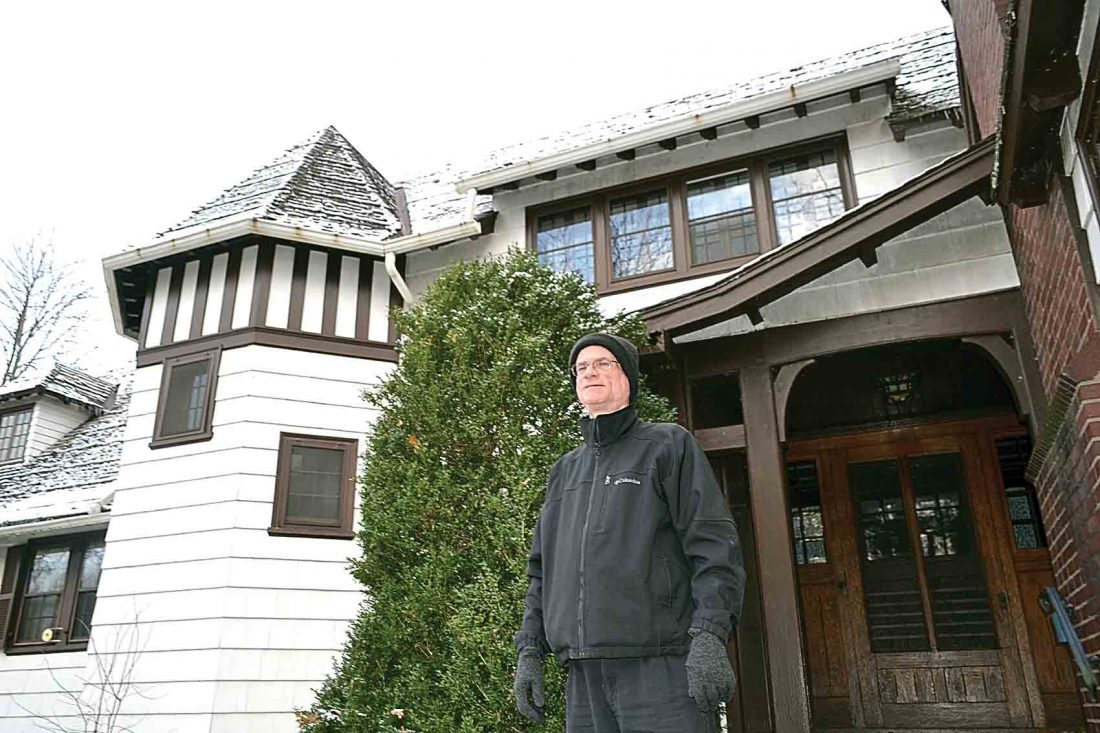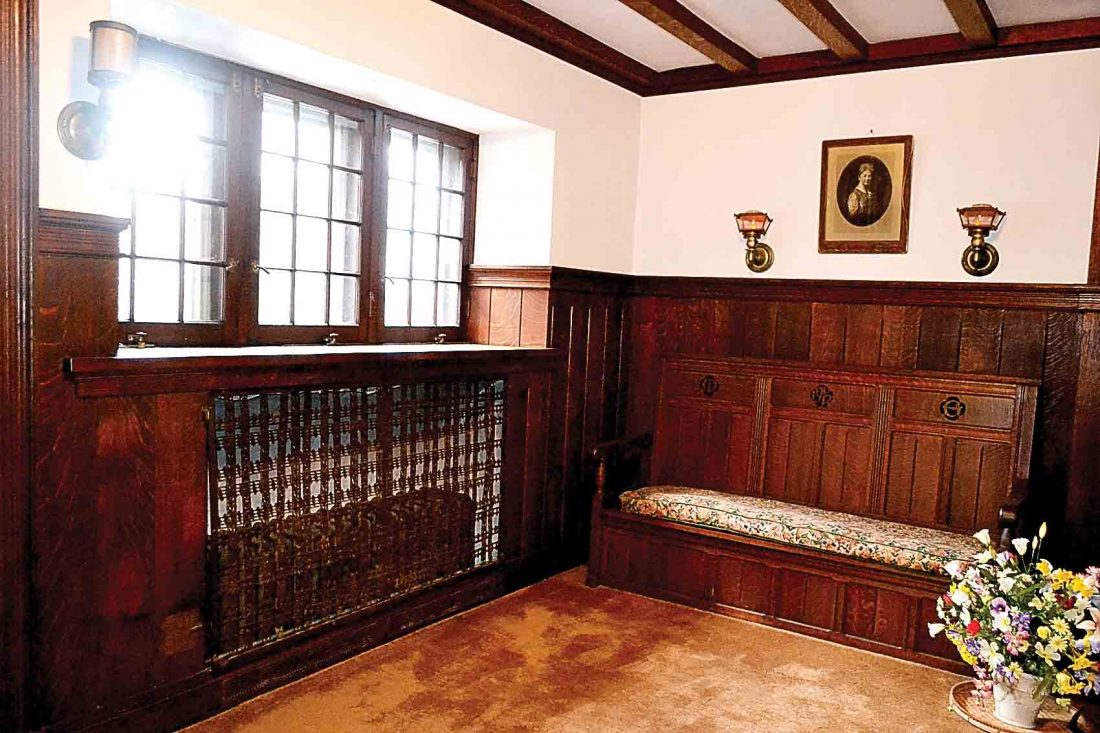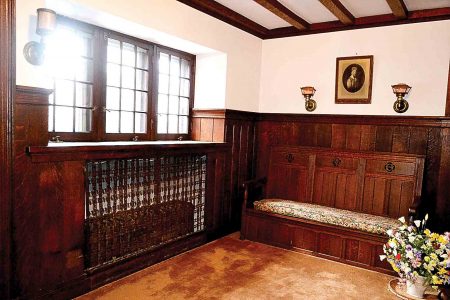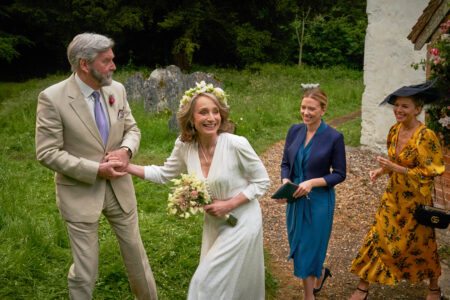House on Millgate Drive steeped in history
- Harley Noland, who owns the 6,000-square-foot English Tudor home with his four siblings, has it up for sale. (Photo by Michele Newbanks)
- The entrance to the home features an original bench which holds blueprints to the house, along with woodwork from the Marietta Chair Company, which was owned by the Mills family. (Photo by Michele Newbanks)

Harley Noland, who owns the 6,000-square-foot English Tudor home with his four siblings, has it up for sale. (Photo by Michele Newbanks)
MARIETTA — Just off Ohio 60, up a steep one-lane road and private drive is an English Tudor home many people may not know exists, although it is tied to some of the most historically well-known residents of Marietta.
The house is on Millgate Drive and was built in 1915 by William Mills for his wife, Betsey Gates Mills.
Long-time Washington County resident Harley Noland currently owns the house with his four siblings. Noland’s mother died several years ago. The house has been for sale for a few months.
“Mom and Dad lived here. I grew up here,” Noland said. “My parents bought it in the mid-1960s through bankruptcy. The owners went bankrupt and they left town with a lot of bills. Creditors seized the house and put it up for sale. It had been standing empty for three years.”
He said that when his parents purchased the property, little worked.

The entrance to the home features an original bench which holds blueprints to the house, along with woodwork from the Marietta Chair Company, which was owned by the Mills family. (Photo by Michele Newbanks)
“None of the utilities worked,” he added.
Still, he said growing up in the 6,000-square-foot house was a lot of fun.
“You can be one with nature in this house. There are so many windows, you can see the trees. We played in the woods,” he said.
The house is in a wooded area on top of the hill with a beautiful view of Marietta.
“We had lots of parties. High school band parties were here. My mother was a science teacher, so the ecology club met here. It’s been used for a lot of different purposes,” he added.
Along with the five bedrooms on the upper level, there are seven or eight rooms on the ground floor, and another 13 or so rooms in the basement.
“There is a laundry, a canning kitchen, and a garage for their one car,” Noland said, noting the garage had fireproof doors, as the cars back then weren’t very reliable.
He said Mills also built a chauffeur’s apartment downstairs and a separate house for the gardener.
The home features a lot of woodwork from the Marietta Chair Company, which was owned by William Mills.
“They knew about wood. They had good woodworkers, so each of the main rooms on the ground floor were done with a different species of wood, so they are showing off their beautiful woods and their skills,” he said.
Woods used in the ground floor rooms include red gum, flamed-grained oak, butternut and pine.
The home was designed by Donald P. Hart, who also designed the Betsey Mills Club, Noland said.
“He started on the house in 1910 and finished in 1915,” he added. “Betsey died in 1920, so she only got to enjoy it for five years. They didn’t have any children.”
Noland said it was common for wealthy residents to have summer homes away from the city.
“The wealthy people of Marietta built country homes because they didn’t want to stay in town because you would get the ‘summer complaint,'” he explained. “Which was, really a form of dysentery, as they didn’t have sewers.”
He said the country homes were built up the Muskingum River, rather than the Ohio River. On the Muskingum, there was agricultural run-off, which was cleaner than the Ohio, with its pollution run-off from the industries in Pittsburgh and Wheeling.
When the people wanted to hold parties, there was an inter-urban trolley line that went out toward the countryside, and the Mills family had their own trolley station at the foot of the hill.
“It was for people who weren’t wealthy enough to own their own cars,” Noland added.
Mills was raised in a home on the corner of Fifth and Putnam streets in Marietta, while his wife, Betsey, grew up next door in a home at the corner of Fourth and Putnam streets. The Betsey Mills Club was built around her childhood home, Noland said.
Scott Britton, local historian and The Castle’s executive director, said the corner house is now part of the club’s parlor.
“The two houses were combined with a gym in the back,” Britton said. “William and Betsey Mills lived in what’s now the Marietta College president’s house on Fifth and Putnam streets.”
He said Betsey was one of three children to Beman Gates and Betsey Shipman Gates.
“The other two children…the oldest was Mary Beman Gates and she was married to Gen. Rufus Dawes, who was a prominent politician and businessman in Marietta,” Britton explained. “The other was Charles, a Marietta College student who died of injuries in the Civil War.”
He added that the oldest son of Rufus and Mary Dawes, former Brigadier General Charles Gates Dawes, was born in what is now the Betsey Mills Club. He went on to become the 30th vice president of the U.S., serving under President Calvin Coolidge. He was also a co-recipient of the Nobel Peace Prize in 1925 for his work on the Dawes Plan after World War I.Britton said the Mills family were community leaders from the very beginning, as well as a big part of Marietta College’s history.
“Charlie Gates was a student. Rufus Dawes and most of his children were Marietta College students and members of the trustees. They always had a connection with Marietta College.”
Betsey was well-known for starting the Monday Club, which taught girls things such as music, sewing, cooking and dance, Noland said.
“This was her life’s work,” he added.
Britton said when Betsey passed, her husband left a legacy with the Betsey Mills Club, which opened in 1927, and with putting bells at the First Congregational United Church of Christ on Front Street in her name.
The home was a labor of love for William Mills and when Betsey died, he had a book written ‘in memoriam’ about his wife and their home, ending with a poem about the peace that dwells at Millgate.
“There’s a peacefulness here. I think that’s why Betsey loved it up here,” Noland said. “It was a rose-covered cottage with trellises around the outside…away from the hustle and bustle, noise and soot of the city.”
Michele Newbanks can be reached at mnewbanks@mariettatimes.com.








